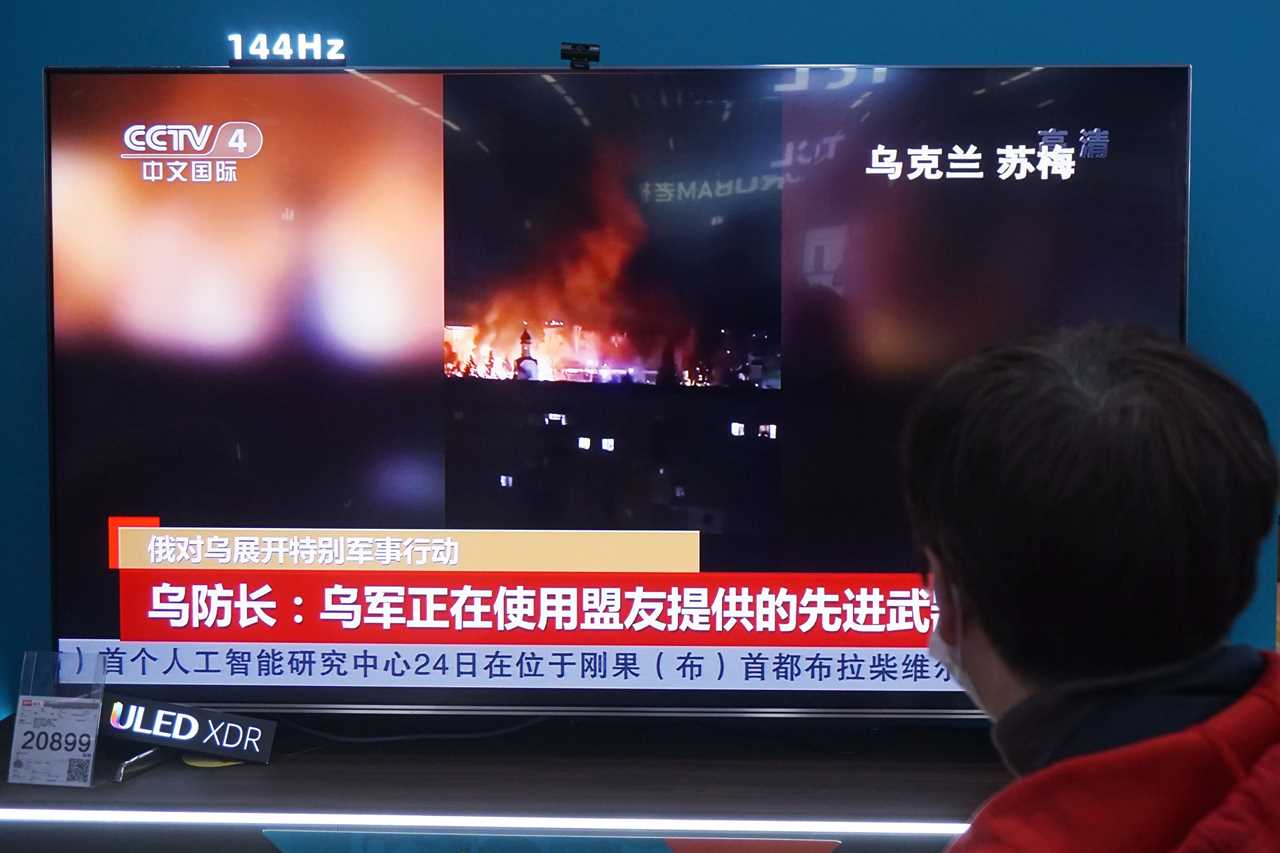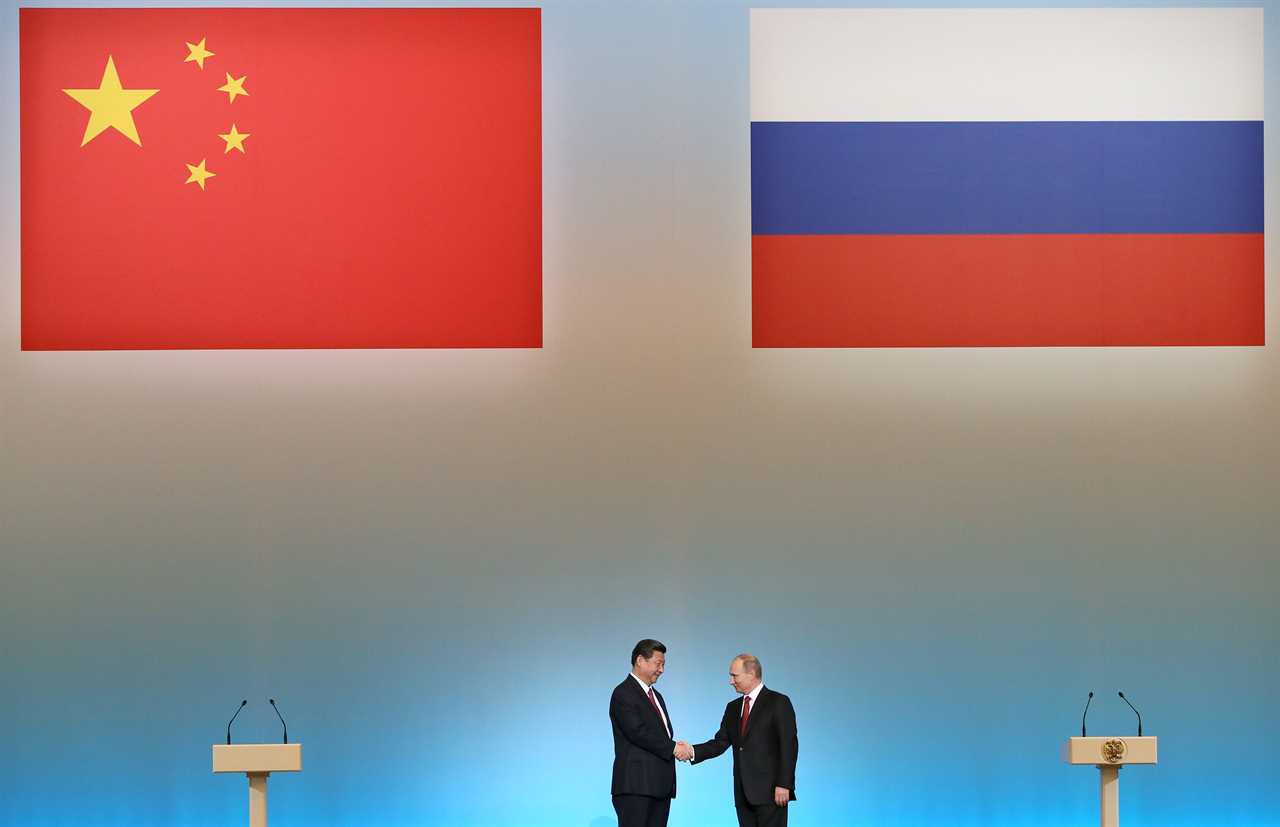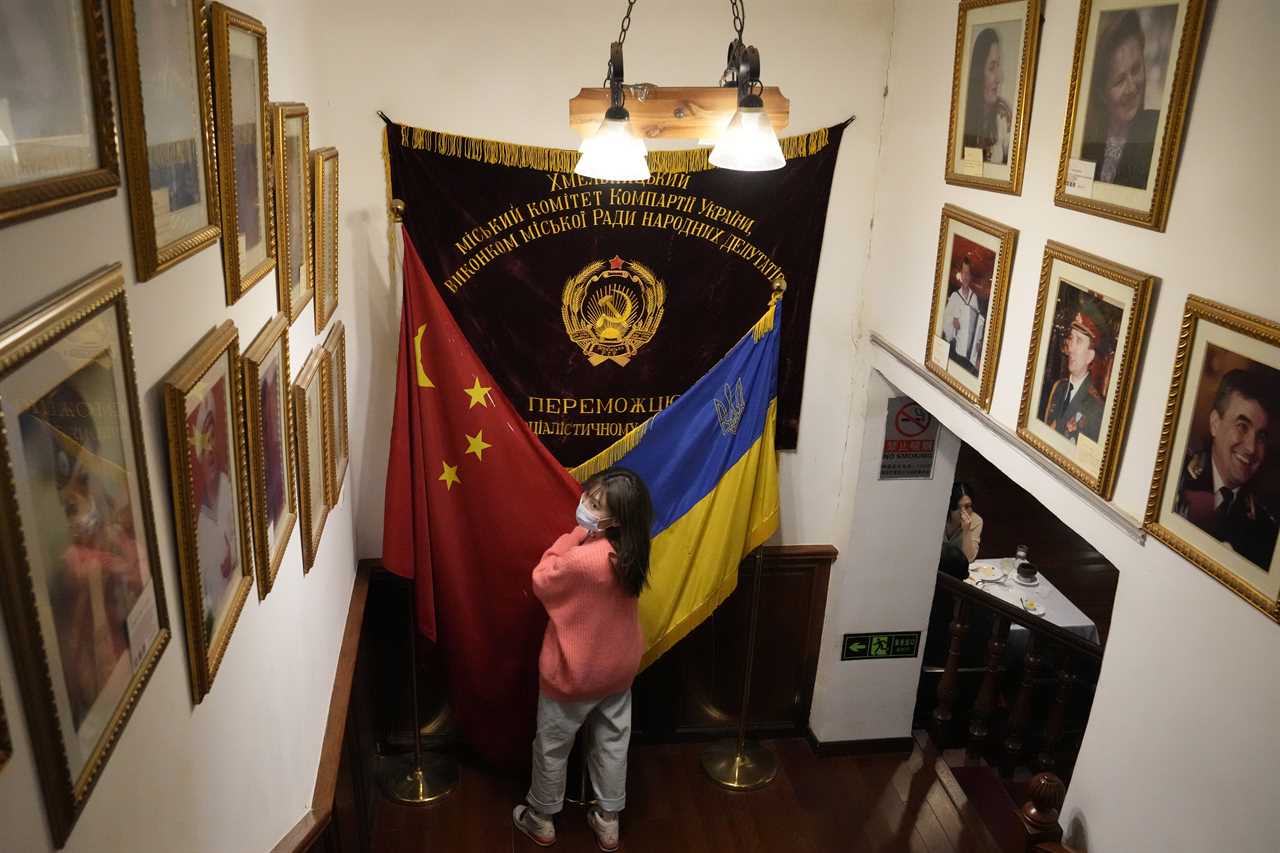
As Russian forces rolled into Ukraine, a reporter asked White House Press Secretary Jen Psaki if the Biden administration was doing anything to prevent China from backing Russia’s aggression. Psaki’s response: “It is really a question for China, on whether they look at that and think that is acceptable behavior.”
In recent weeks, China has touted its strategic partnership with Russia while being circumspect about Moscow’s threats to Ukraine, raising questions about whether the two authoritarian powers will stick together. There’s even been speculation that Russian President Vladimir Putin conferred with Chinese President Xi Jinping before deciding to invade or that China will take notes for a future invasion of Taiwan.
The reality is that a Russian invasion of Ukraine was probably not China’s preferred outcome. But now that it’s happened, China will likely find ways to support Russia while leveraging the crisis for its own benefit. The two countries genuinely share a worldview of the West as aggressor and China and Russia as victims. More tangibly, China will also seek to profit from Russia’s economic and political isolation.
China will likely continue to walk a fine line to skirt international condemnation, as the readout from Xi’s Friday call with Putin shows. But this war fits squarely with China’s preferred global order: a world in which big countries enjoy a “sphere of influence” that gives them the final say over political, military and economic affairs in their neighborhood.
On February 4, Xi and Putin met in person for the first time in two years and released a landmark Joint Statement declaring that their partnership — which has been deepening for decades but reached new heights under Xi and Putin — has “no limits.” Still, in the subsequent days, Chinese diplomats continued to call for all parties to exercise restraint, while taking deliberately non-committal positions like saying that the “legitimate security concerns” of all countries should be upheld.
As the invasion became imminent, though, China quickly turned to anti-U.S. rhetoric as a means of deflecting questions about Russia. On Wednesday, just before the invasion, Foreign Ministry Spokesperson Hua Chunying tried to shift blame by saying the United States was “the culprit of current tensions surrounding Ukraine.” Hua also appeared to confirm that China would not sanction Russia, although some Chinese financial institutions are reportedly taking steps to avoid running afoul of U.S. sanctions. Hua restated Beijing’s long-held view that “illegal unilateral” “sanctions are never fundamentally effective means to solve problems.” (Never mind China’s imposition of sanctions on U.S. companies earlier in the week.) The next day Hua launched into an anti-U.S. diatribe and claimed that “NATO still owes the Chinese people a debt of blood” from the accidental bombing of the Chinese Embassy in Belgrade in 1999.
The rhetoric demonstrates two key ways in which the worldviews of Beijing and Moscow — and especially of Xi and Putin themselves — overlap. One is familiar to Western observers: antagonism toward the U.S. But the second has to do with the two countries’ shared attitude toward questions of their national borders and national sovereignty more generally. One key line of the joint statement asserts, “The sides reaffirm their strong mutual support for the protection of their core interests, state sovereignty and territorial integrity, and oppose interference by external forces in their internal affairs.”

That sentence may read somewhat richly given Russia’s brazen invasion of Ukraine. However byzantine and contradictory the logic, both Beijing and Moscow contend that the biggest risk is not to Ukraine’s sovereignty and security, but to Russia’s. And they agree that this risk comes from “exclusive blocs and alliances of convenience.” As they look out to their periphery, both China and Russia see a wall of U.S. allies and partners looking to “contain” them. For Russia, it’s NATO; for China, it’s U.S. alliances with Japan and South Korea, and the recent Australia-United Kingdom-United States (AUKUS) agreement. As Hua put it on Thursday, “China still faces a realistic threat from the US flanked by its several allies as they wantonly and grossly meddle in China’s domestic affairs and undermine China’s sovereignty and security.”
Beijing and Moscow see themselves as “back to back” in Eurasia. Notably, the joint statement explicitly opposed both NATO expansion and AUKUS, highlighting just how similar the two countries’ threat perceptions are. Indeed, the document can be read as a manifesto for revising the global political and security order to make the world safe for authoritarianism.
China and Russia believe big powers should be entitled to special considerations for protecting their sovereignty — including, apparently, a veto over the choices of their smaller neighbors. For them, protecting sovereignty is inextricably connected to their own political, or regime, security — whereas in the West, the term is generally used to apply equally to all states with no special provisions for more powerful countries. Ultimately, when Ukraine’s sovereignty and Russia’s “sovereignty” compete, China will side with Russia — in part because Beijing wants similar prerogatives in East Asia. (Both powers argue the United States has enjoyed similar privileges in the Western Hemisphere since imposing the Monroe Doctrine in 1823, and as major powers, they’re entitled to their own versions.)
Moscow’s war in Ukraine reflects the countries’ aligned geopolitical philosophies, but could also present Beijing with tangible opportunities beyond supporting an authoritarian comrade. China relishes being the more powerful state in a lopsided partnership with Russia (doubly so because it turns their early Cold War experience on its head). Beijing is happy to provide Putin the public symbolism of equal partnership as long as it wins on the material benefits.
Since Russia annexed Crimea in 2014, Russia’s reliance on China has grown in proportion to its isolation from the United States, Europe, and democracies in Asia, especially Japan. Bilateral trade has more than doubled since 2015, when the West first imposed sanctions. Now, Western punishments for the war in Ukraine will likely force Putin to be even more pliant toward Xi. No doubt Chinese officials are already drawing up a wish list. China will likely demand further discounts for Russian energy supplies as Moscow’s energy weapon turns on itself with fewer European buyers. China cannot backfill for all the trade and technology Russia will lose to crushing sanctions. But that’s much more Moscow’s problem than Beijing’s.
Technology cooperation between the two, already a pillar of the partnership, will likely increase, with China pushing Russia to adopt its standards. The Ukraine crisis provides an impetus for both China and Russia to further insulate themselves against sanctions by pursuing workarounds for the SWIFT payments system and other measures.
Militarily, China sees the potential for U.S. attention and resources to be (re)directed from the Indo-Pacific to European theater. Beijing interpreted the wars in Iraq and Afghanistan as creating a “period of strategic opportunity” for China by consuming American strategic focus. Strategists in China who hate the idea of a U.S. rebalance to Asia are likely salivating with hopes that the Ukraine war could beget another such period. Meanwhile, Russia will have to defer more to China when considering steps that might balance Chinese power in the Indo-Pacific, especially high-end arms sales to countries like India and Vietnam.
Regarding Taiwan, so far it does not appear China will take the opportunity presented by a war in Europe to move against the island; it’s too risky in the short term and any full-scale invasion would require amassing forces in advance. China is probably more interested in the symbolism and the precedent: Seeing a Western-leaning democracy crushed by a neighboring authoritarian power will give China succor. China knows recognizing Donestk and Luhansk is just a pretext for Russia to secure territory it believes it has a historic right to. In a potential takeover of Taiwan, China would likely employ analogous justifications.
To be sure, Russia’s attack presents a geopolitical mixed bag for China. Shocks to global financial and energy markets could add to China’s existing economic headwinds during a politically sensitive year: In the fall, Xi will seek a third five-year term as the country’s leader.
Then there are China’s ties to Ukraine itself. The two countries just celebrated the 30th anniversary of diplomatic relations in January. Ukraine officially joined China’s Belt and Road Initiative in 2017. And the pair trade in agricultural goods and aircraft parts, despite Kyiv blocking a major deal with Chinese investors in 2021. Still, a newly installed Russian client state could eventually prove to be as good a partner for China as the current Western-backed government in Ukraine.

China clearly worries about potentially being targeted with secondary sanctions for doing business with Russia. But Beijing is already subject to a slew of restrictions and has been building up its tools to blunt and retaliate against sanctions in expectation of more. In addition, Russia’s invasion will also have ramifications for the global nuclear nonproliferation regime that China claims to support. Ukraine agreed to give up its Soviet-era nuclear weapons in 1994 in exchange for security assurances, including later from China. More countries facing down powerful neighbors are likely to pursue nuclear weapons, while states that already have them will be more reluctant to give them up.
Finally, backing — explicitly or implicitly — Russian aggression could harden attitudes toward China across Europe. The continent is shifting from the more pro-engagement China policy of former German Chancellor Angela Merkel toward one that treats China as a “systemic rival” in a league of autocrats with revanchist Russia. Beijing presumably has some similar concerns with Washington, although U.S.-China relations are already in a bad state so there’s less to lose.
For these reasons and more, it seems unlikely that Xi encouraged or even agreed with Putin’s decision to use force against Ukraine. Or the Chinese might have wrongly concluded that Russia was just posturing for concessions, despite Washington reportedly trying to convince them otherwise. Either way, Putin conspicuously waited to invade until the Beijing Olympics ended to avoid overshadowing Xi’s athletic pageantry, suggesting some Russian deference to China’s interests.
One of the core principles of deepening China-Russia ties has been “not always with each other, but never against each other.” Beijing might not completely support Moscow’s decision, but Xi will be loath to oppose it — and eager to capitalize on it. Beijing’s response is likely to be a combination of closing ranks with Moscow to defend a common worldview while finding ways to leverage Russia’s isolation to China’s advantage.
China and Russia are closer than ever. What remains to be seen is when and whether their partnership will become too close for comfort.
----------------------------------------
By: Jacob Stokes
Title: Opinion | Why China Sees Opportunity in Russia’s Invasion of Ukraine
Sourced From: www.politico.com/news/magazine/2022/02/25/how-china-views-russias-invasion-of-ukraine-00011868
Published Date: Fri, 25 Feb 2022 15:37:11 EST






